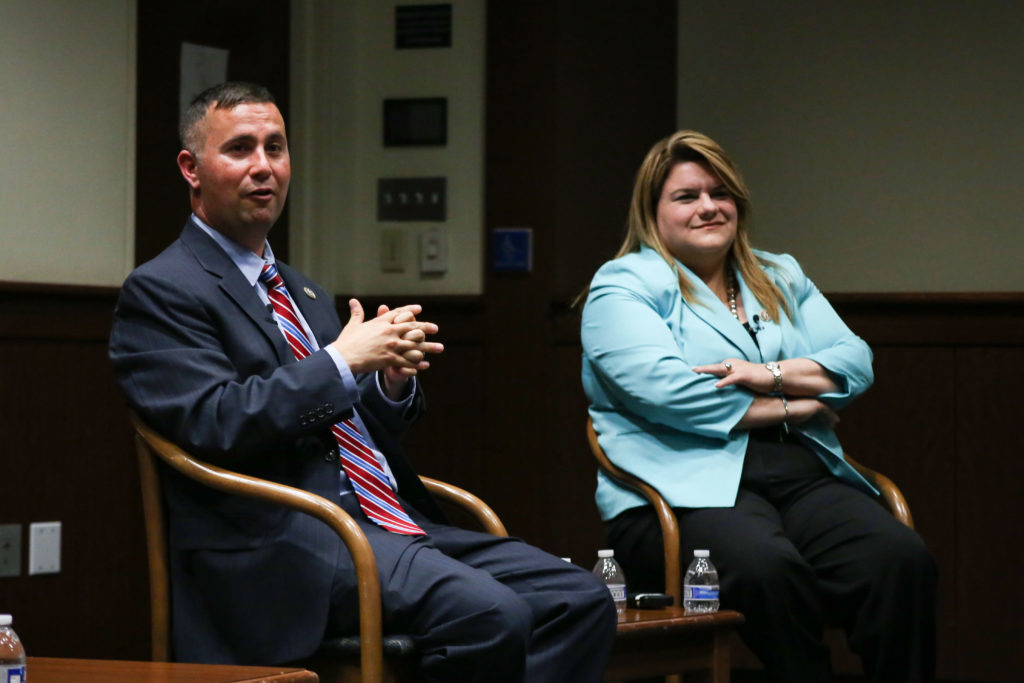Two Latino politicians spoke at the Marvin Center Thursday about the importance of bipartisanship and diversity in Congress.
The event, hosted by the Cisneros Hispanic Leadership Institute and the GW League of United Latin American Citizens, featured Rep. Darren Soto, D-Fla., and Resident Commissioner Jenniffer González-Colón, a Republican non-voting Congressional representative from Puerto Rico. Laura Maristany, the associate director for constructive politics at the Democracy Fund, a bipartisan investment company, moderated the discussion.
Soto, a GW Law School alumnus, discussed his opposition to the proposed Mexican border wall and his desire to work for immigration reform during the panel. González-Colón, the first female resident commissioner of Puerto Rico, spoke about the need to work across party lines to enact change.
Soto and González-Colón, both of Puerto Rican descent, also discussed the status of the island’s recovery after Hurricane Maria and the difficulties of sending aid to the island.
Here are some highlights from the event:
1. Bipartisanship in lawmaking
Although Soto and González-Colón hail from opposing political parties, the two talked about how Hispanic politicians share a personal connection that preserves bipartisanship in the political process.
“Hispanics, we tend to unite more, we tend to communicate better,” González-Colón said. “Although we may be in different parties, we are united in many issues – why not sign letters together?”
At the event, González-Colón thanked Soto for supporting Puerto Rico in Congress when needed because resident commissioners are non-voting members of Congress.
“For Puerto Rico – always,” Soto said, as the audience erupted in applause.
Soto said he has been a longtime believer in Hispanic bipartisanship and voted to admit a Republican congressman from Miami to the all-Democratic Congressional Hispanic Caucus in November. The caucus ultimately voted to exclude the representative in a highly publicized controversy.
“We’re like 99.95 percent on the same page. A lot of times we become the bridge to allow some of these big solutions to happen, because our leadership tries to pull us in opposite directions but – abrazos a todos – we’re here to work together on all of these issues,” Soto said, using the Spanish phrase “hugs to all.”
2. Minority representation in elected offices
Maristany said that even though Latinos make up 18 percent of the population, they are vastly underrepresented in Congress.
Currently, there are a record 38 Hispanic members of Congress – making up about 7 percent of the chamber.
“It is the institution of our government that really has the power to ensure that we all have access to the American dream,” Maristany said. “But unfortunately, it is also an institution that still doesn’t look like America.”
While the panelists talked about the need for Hispanic representation in Congress, they also emphasized that constituents should vote for representatives based on their personal values and beliefs.
“I don’t think that if you disagree with someone who is Hispanic that you should still vote for them,” Soto said. “You should vote for who you want to vote for.”
3. Youth activism
González-Colón and Soto both said young people need to be more involved in politics and should speak out against the Trump administration if they have complaints about policy decisions.
Both representatives were activists from an early age – González-Colón became the youngest member of the Puerto Rican House of Representatives at the age of 25, and Soto joined the Young Democrats and knocked on doors for candidates before running for a seat in Congress.
“If you don’t vote and you don’t speak up, then you don’t count,” Soto said. “If you don’t like what’s going on in Washington, you have to do these things of protests, meeting with your representatives, vote, speak to your neighbors, knock on doors, write op-eds – any number of things.”





